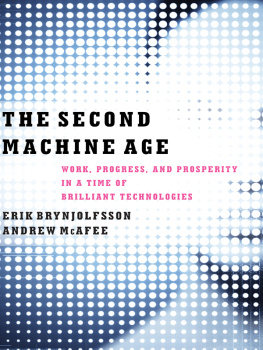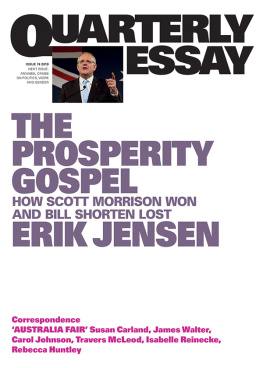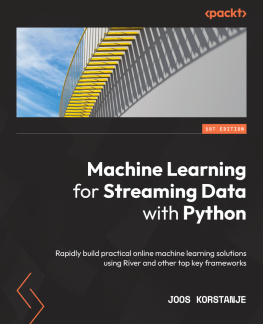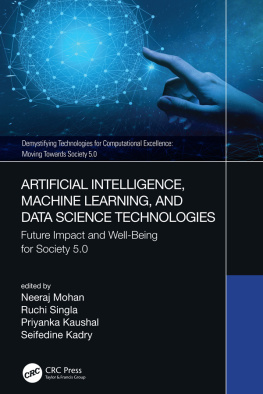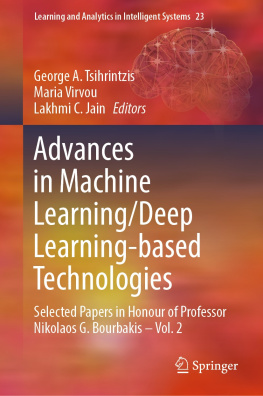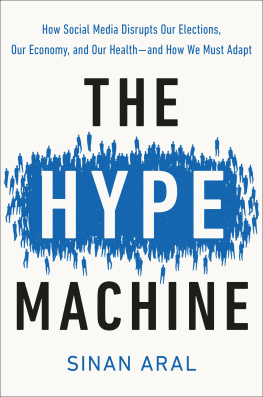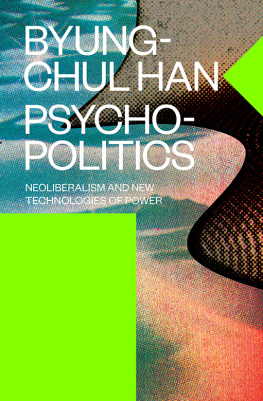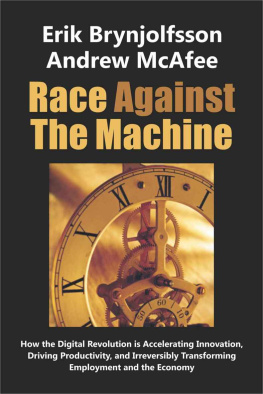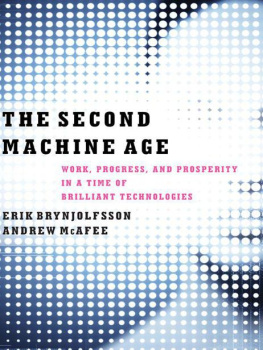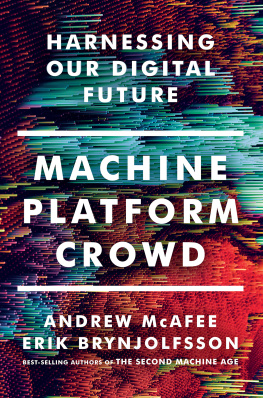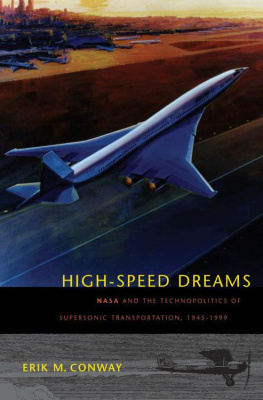Brynjolfsson Erik - Second Machine Age: Work, Progress, and Prosperity in a Time of Brilliant Technologies
Here you can read online Brynjolfsson Erik - Second Machine Age: Work, Progress, and Prosperity in a Time of Brilliant Technologies full text of the book (entire story) in english for free. Download pdf and epub, get meaning, cover and reviews about this ebook. year: 2013, publisher: W W Norton & Co Inc, genre: Romance novel. Description of the work, (preface) as well as reviews are available. Best literature library LitArk.com created for fans of good reading and offers a wide selection of genres:
Romance novel
Science fiction
Adventure
Detective
Science
History
Home and family
Prose
Art
Politics
Computer
Non-fiction
Religion
Business
Children
Humor
Choose a favorite category and find really read worthwhile books. Enjoy immersion in the world of imagination, feel the emotions of the characters or learn something new for yourself, make an fascinating discovery.
- Book:Second Machine Age: Work, Progress, and Prosperity in a Time of Brilliant Technologies
- Author:
- Publisher:W W Norton & Co Inc
- Genre:
- Year:2013
- Rating:3 / 5
- Favourites:Add to favourites
- Your mark:
- 60
- 1
- 2
- 3
- 4
- 5
Second Machine Age: Work, Progress, and Prosperity in a Time of Brilliant Technologies: summary, description and annotation
We offer to read an annotation, description, summary or preface (depends on what the author of the book "Second Machine Age: Work, Progress, and Prosperity in a Time of Brilliant Technologies" wrote himself). If you haven't found the necessary information about the book — write in the comments, we will try to find it.
Brynjolfsson Erik: author's other books
Who wrote Second Machine Age: Work, Progress, and Prosperity in a Time of Brilliant Technologies? Find out the surname, the name of the author of the book and a list of all author's works by series.
Second Machine Age: Work, Progress, and Prosperity in a Time of Brilliant Technologies — read online for free the complete book (whole text) full work
Below is the text of the book, divided by pages. System saving the place of the last page read, allows you to conveniently read the book "Second Machine Age: Work, Progress, and Prosperity in a Time of Brilliant Technologies" online for free, without having to search again every time where you left off. Put a bookmark, and you can go to the page where you finished reading at any time.
Font size:
Interval:
Bookmark:

More Praise for The Second Machine Age
Brynjolfsson and McAfee are right: we are on the cusp of a dramatically different world brought on by technology. The Second Machine Age is the book for anyone who wants to thrive in it. Ill encourage all of our entrepreneurs to read it, and hope their competitors dont.
Marc Andreessen, cofounder of
Netscape and Andreessen Horowitz
What globalization was to the economic debates of the late 20th century, technological change is to the early 21st century. Long after the financial crisis and great recession have receded, the issues raised in this important book will be central to our lives and our politics.
Lawrence H. Summers, Charles W. Eliot
University Professor at Harvard University
Technology is overturning the worlds economies, and The Second Machine Age is the best explanation of this revolution yet written.
Kevin Kelly, senior maverick for Wired
and author of What Technology Wants
Brynjolfsson and McAfee take us on a whirlwind tour of innovators and innovations around the world. But this isnt just casual sightseeing. Along the way, they describe how these technological wonders came to be, why they are important, and where they are headed.
Hal Varian, chief economist at Google
In this optimistic book Brynjolfsson and McAfee clearly explain the bounty that awaits us from intelligent machines. But they argue that creating the bounty depends on finding ways to race with the machine rather than racing against the machine. That means people like me need to build machines that are easy to master and use. Ultimately, those who embrace the new technologies will be the ones who benefit most.
Rodney Brooks, chairman and
CTO of Rethink Robotics, Inc
New technologies may bring about our economic salvation or they may threaten our very livelihoods... or they may do both. Brynjolfsson and McAfee have written an important book on the technology-driven opportunities and challenges we all face in the next decade. Anyone who wants to understand how amazing new technologies are transforming our economy should start here.
Austan Goolsbee, professor of economics at the University
of Chicago Booth School of Business and former
chairman of the Council of Economic Advisers
After reading this book, your world view will be flipped: youll see that collective intelligence will come not only from networked brains but also from massively connected and intelligent machines. In the near future, the best job to have will be the one you would do for free.
Nicholas Negroponte, cofounder of the
MIT Media Lab, founder of One Laptop
per Child, and author of Being Digital
The Second Machine Age helps us all better understand the new age we are entering, an age in which by working with the machine we can unleash the full power of human ingenuity. This provocative book is both grounded and visionary, with highly approachable economic analyses that add depth to their vision. A must-read.
John Seely Brown, coauthor of
The Power of Pull and A New Culture of Learning
Brynjolfsson and McAfee do an amazing job of explaining the progression of technology, giving us a glimpse of the future, and explaining the economics of these advances. And they provide sound policy prescriptions. Their book could also have been titled Exponential Economics 101it is a must-read.
Vivek Wadhwa, director of research at Duke
Universitys Pratt School of Engineering
and author of The Immigrant Exodus
Also by Erik Brynjolfsson and Andrew McAfee
RACE AGAINST THE MACHINE
How the Digital Revolution Is Accelerating Innovation,
Driving Productivity, and Irreversibly Transforming Employment
and the Economy
Also by Erik Brynjolfsson
WIRED FOR INNOVATION
Also by Andrew McAfee
ENTERPRISE 2.0
New Collaborative Tools for your Organizations Toughest Challenges

ERIK BRYNJOLFSSON ANDREW MCAFEE

Copyright 2014 by Erik Brynjolfsson and Andrew McAfee
All rights reserved
First Edition
For information about permission to reproduce selections from this book, write to Permissions, W. W. Norton & Company, Inc.,
500 Fifth Avenue, New York, NY 10110
For information about special discounts for bulk purchases, please contact W. W. Norton Special Sales at specialsales@wwnorton.com or 800-233-4830
Book design by Lovedog Studio
Production manager: Devon Zahn
ISBN 978-0-393-23935-5
ISBN 978-0-393-24125-9 (e-book)
W. W. Norton & Company, Inc.
500 Fifth Avenue, New York, N.Y. 10110
www.wwnorton.com
W. W. Norton & Company Ltd.
Castle House, 75/76 Wells Street, London W1T 3QT
To Martha Pavlakis, the love of my life.
To my parents, David McAfee and Nancy Haller, who prepared me for the second machine age by giving me every advantage a person could have.

Chapter 15 TECHNOLOGY AND THE FUTURE
(Which Is Very Different from Technology Is the Future)
Technology is a gift of God. After the gift of life it is perhaps the greatest of Gods gifts. It is the mother of civilizations, of arts and of sciences.
Freeman Dyson
WHAT HAVE BEEN THE most important developments in human history?
As anyone investigating this question soon learns, its difficult to answer. For one thing, when does human history even begin? Anatomically and behaviorally modern Homo sapiens , equipped with language, fanned out from their African homeland some sixty thousand years ago.1 By 25,000 BCE2 they had wiped out the Neanderthals and other hominids, and thereafter faced no competition from other big-brained, upright-walking species.
We might consider 25,000 BCE a reasonable time to start tracking the big stories of humankind, were it not for the development-retarding ice age earth was experiencing at the time.3 In his book Why the West RulesFor Now , anthropologist Ian Morris starts tracking human societal progress in 14,000 BCE, when the world clearly started getting warmer.
Another reason its a hard question to answer is that its not clear what criteria we should use: what constitutes a truly important development? Most of us share a sense that it would be an event or advance that significantly changes the course of thingsone that bends the curve of human history. Many have argued that the domestication of animals did just this, and is one of our earliest important achievements.
The dog might well have been domesticated before 14,000 BCE, but the horse was not; eight thousand more years would pass before we started breeding them and keeping them in corrals. The ox, too, had been tamed by that time (ca. 6,000 BCE) and hitched to a plow. Domestication of work animals hastened the transition from foraging to farming, an important development already underway by 8,000 BCE.4
Agriculture ensures plentiful and reliable food sources, which in turn enable larger human settlements and, eventually, cities. Cities in turn make tempting targets for plunder and conquest. A list of important human developments should therefore include great wars and the empires they yielded. The Mongol, Roman, Arab, and Ottoman empiresto name just fourwere transformative; they affected kingdoms, commerce, and customs over immense areas.
Next pageFont size:
Interval:
Bookmark:
Similar books «Second Machine Age: Work, Progress, and Prosperity in a Time of Brilliant Technologies»
Look at similar books to Second Machine Age: Work, Progress, and Prosperity in a Time of Brilliant Technologies. We have selected literature similar in name and meaning in the hope of providing readers with more options to find new, interesting, not yet read works.
Discussion, reviews of the book Second Machine Age: Work, Progress, and Prosperity in a Time of Brilliant Technologies and just readers' own opinions. Leave your comments, write what you think about the work, its meaning or the main characters. Specify what exactly you liked and what you didn't like, and why you think so.

